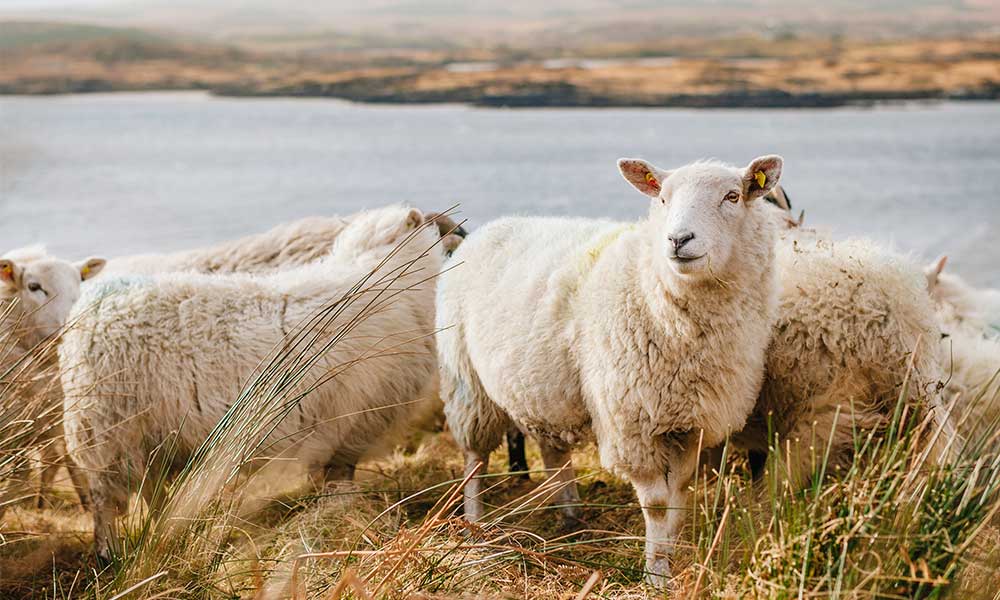(The Lord is My Shepherd - Part 1 | Part 2)
In the first part of this study, we concentrated on the shepherd. In the second part, we want to better see the relationship between the shepherd and his sheep, how he cares and protects the flock, even at the cost of his own life.
The analogy between man and sheep is a common one in the Bible.
The Scripture: Psalm 74:1; 95:7; 100:3
"Why have you rejected us forever, O God? Why does Your anger smolder against the sheep of Your pasture?"; Come let us bow down in worship, let us kneel before the Lord our Master; for He is our God and we are the people of His pasture, the flock under His care"; "Know that the Lord is God. It is He who made us and we are His; we are His people, the sheep of His pasture."
1. What are God's people called in these verses?
A careful study of sheep shows that this analogy is not always complimentary, yet it is not difficult to understand why God compares people and sheep.
Without a shepherd, both men and sheep are helpless creatures
The Scripture: Matthew 9:36
"When He (Jesus) saw the crowds, He had compassion on them, because they were harassed and helpless, like sheep without a shepherd."
2. Why did Jesus have compassion on the crowds?
Without care, human beings are helpless for the first years of their lives. Likewise, sheep are dependent upon the shepherd throughout most of their lives. They require more care than any other class of livestock.
Both Are Rebellious
The Scripture: Isaiah 53:6
Time and time again, the Bible refers to the rebelliousness of the Israelites.
"We all, like sheep, have gone astray, each of us has turned to his own way."
3. In what way does Isaiah compare people to sheep?
The Scripture: Exodus 32:9 and Acts 7:51
On the occasion of the building of the golden calf, the Lord had this to say about them: "I have seen these people,' the Lord said to Moses, 'and they are a stiff-necked people”; Stephen, too, used the same adjective to describe them: "You stiff-necked people, with uncircumcised hearts and ears! You are just like your fathers: You always resist the Holy Spirit."
4. How do the Lord and Stephen describe the Israelites?
A popular song from the recent musical past was a song called, "I Did It My Way," in which the singer glorifies his own rebellious nature.
Both men and sheep are fearful
The Scripture: Matthew 14:27; Mark 5:36, 9:6; Luke 2:9
"Jesus immediately said to them 'Take courage! It is I. Don't be afraid'"; Jesus told the synagogue leaders. 'Don't be afraid; just believe'"; He (Peter) did not know what to say, they were so frightened"; "An angel of the Lord appeared to them, and the glory of the Lord shone around them, and they were terrified."
5. What is indicated in these verses?
Time and time again, the Bible shows us what fearful creatures men are. Sheep are fearful creatures as well. They even refuse to lie down unless they are free from all fears. This includes being free from the friction of other sheep. The shepherd's presence reassures his sheep and they will stop fighting when he is with them.
Both sheep and men are social creatures
In the first part of this study, we related the story the prophet Nathan told David of the pet ewe lamb belonging to the poor farmer.
On most farms, young rams are the family pets. When my family visited a working ranch, a young ram "fell in love" with my daughter. When it was time for us to leave, he began to bleat pitifully. As we left, he tried to get into the car with us, and he followed our car down the road.
Man is a social creature, too. He lives in community and cannot survive without love and affection of other people.
Like people, each sheep has his own name.
Both sheep and people are given names and come when they are called. A discouraged friend commented to another friend, "I don't think the Lord even knows my name." A few days later while out driving in her car, she very distinctly heard her name being called. Looking around, she realized she was alone in the car. It was the Lord who had called her - by name.
Both have mob instincts
Like cattle and men, sheep easily become mobs. When one runs, they are quick to stampede.
The Scripture: John 6:15
"Jesus, knowing that they intended to come and make Him king by force, withdrew again to a mountain by Himself."
6. What did the mob want to do?
The Scripture: Luke 4:28, 29
"All the people in the synagogue were furious when they heard this. They got up, drove Him (Jesus) out of the town, and took Him to the brow of the hill on which the town was built, in order to throw Him down the cliff."
7. What did the mob attempt to do to Jesus?
The Scripture: Luke 23:23-24
"With a loud shout they insistently demanded that He (Jesus) be crucified and their shouts prevailed. So Pilate decided to grant their demand."
8. What did the crowd demand?
Although most of these characteristics are evident in both sheep and men, we are changed when we give our lives to the Lord and accept Him as our shepherd.
Sheep know the sound of their shepherd's voice
In the East, the different flocks of sheep frequently mingle together. A missionary tells the story of watching how sheep follow their own shepherd. Fascinated, he studied the shepherd's voice until he thought he could imitate it perfectly. However, one day when he decided to imitate the shepherd's voice in the midst of the sheep, the sheep didn't even lift their heads. Constant companionship with their shepherd made it impossible for the sheep to mistake their shepherd's voice for any other.
The Scripture: John 10: 4-5
"When he (the shepherd) has brought out all his own, he goes on ahead of them, and his sheep follow him because they know his voice. But they will never follow a stranger; in fact, they run away from him because they do not recognize a stranger's voice."
9. Why will the sheep not follow a stranger?
10. Why do they follow their shepherd?
Jesus is the gate
In the book of John, Jesus uses another analogy. He calls himself the gate.
The Scripture: John 10: 7-10
"I am the gate for the sheep. All whoever came before Me were thieves and robbers, but the sheep did not listen to them. I am the gate; whoever enters through Me will be saved. He will come in and go out and find pasture. The thief comes only to steal and kill and destroy; I have come that they may have life. And have it to the full."
11. What are all who came before Jesus?
12. What happens to the one who enters through the gate?
13. What does the thief do?
14. Why has Jesus come?
Too frequently in this day and age, we read much about cults and false sects. People are only too quick to follow a stranger's voice and be led into destruction. Let us determine that we are sheep who know our shepherd's voice and follow Him only.
The Answers
- The sheep or God's flock
- They were harassed and helpless, like sheep without a shepherd.
- All have gone astray.
- As stiff-necked
- The people were afraid.
- Forcibly make Jesus king
- Throw Him down the cliff
- That Jesus be crucified
- Because they don't recognize his voice
- Because they know his voice
- Thieves and robbers
- He will be saved.
- He steals, kills and destroys.
- That we may have life to the full
All scripture quotations in this publication are from the Holy Bible, New International Version
(unless otherwise indicated)
Copyright © 1973, 1978, 1984, New International Bible Society
Copyright © 2002 by JoAnne Sekowsky





